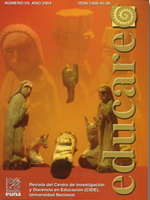Un acercamiento al cuento infantil desde la perspectiva de género. Estereotipos en el cuento infantil
DOI:
https://doi.org/10.15359/ree.2004-7.7Abstract
What is the role of each woman in society ? What are a man`s demands in regards to a woman`s behavior? Have the feminine and masculine stereotypes clearly presented to us in stories changed? Are we still, as humans, favoring stereotypes? Is inversión still taking place in both, stories and real life? The Greek myth about Medusa introduces the topic of gender and literature, especially in children's literature. Different topics may be discussed from a gender perspective; in this case, the article focuses on stereotypes: those derived from the woman as an angel and the woman as the devil. Throughout history, the world of symbolism, of meaning and sense has been present in the minds of men, who have represented the world to their visible reflection. They are the prototype, model and size of that which exists. In children's stories, we can clearly see the stereotypes imposed by the patriarchal culture; however, we can also see how some of them are able to subvert a pre-established order. What is most important is that reading children stories and literature in general, enables us to move and be moved as readers; it leaves a trace, because it question us.
References
Calvo, Y. (2002) Literatura, mujer y sexismo. Editorial Universidad Nacional, Heredia, Costa Rica
Chase, Alfonso (1992) Fábula de fábulas. Editorial Costa Rica, San José
Gilbert, S. y Susan G. (1984). The madwoman in the attic. NineteenthCentury Literay Imagination, Yale University.
Lyra, C. (1997) Los cuentos de mi Tía Panchita. Educa. San José, Costa
Rica.
Macaya, E. (1997). Espíritu en carne altiva. Editorial Universidad de Costa Rica. San José.
Pinkola Estés, C. (2003). Mujeres que corren con los lobos. Punto de lectura.
Madrid. España.
Ríos, L. (1986). El rey que deseaba escribir un cuento. Ministerio de Cultura, Juventud y Deporte. San José, Costa Rica.
Rubio, Carlos (2001). Por la tierra de las hadas. Editorial URUK, San
José, Costa Rica.
Rubio, C. (1990). Queremos jugar. Editorial Norma, San José, Costa Rica. http://www.estudiqsonline.net/texts/moraza.html)
Downloads
Published
How to Cite
Issue
Section
License
1. In case the submitted paper is accepted for publication, the author(s) FREELY, COSTLESS, EXCLUSIVELY AND FOR AN INDEFINITE TERM transfer copyrights and patrimonial rights to Universidad Nacional (UNA, Costa Rica). For more details check the Originality Statement and Copyright Transfer Agreement
2. REUTILIZATION RIGHTS: UNA authorizes authors to use, for any purpose (among them selfarchiving or autoarchiving) and to publish in the Internet in any electronic site, the paper´'s final version, both approved and published (post print), as long as it is done with a non commercial purpose, does not generate derivates without previous consentment and recognizes both publisher's name and authorship.
3. The submission and possible publication of the paper in the Educare Electronic Journal is ruled by the Journal’s editorial policies, the institutional rules of Universidad Nacional and the laws of the Republic of Costa Rica. Additionally, any possible difference of opinion or future dispute shall be settled in accordance with the mechanisms of Alternative Dispute Resolution and the Costa Rican Jurisdiction.
4. In all cases, it is understood that the opinions issued are those of the authors and do not necessarily reflect the position and opinion of Educare, CIDE or Universidad Nacional, Costa Rica. It is also understood that, in the exercise of academic freedom, the authors have carried out a rogorous scientific-academic process of research, reflection and argumentation thar lays within the thematic scope of interest of the Journal.
5. The papers published by Educare Electronic Journal use a Creative Commons License:















 The articles published by Educare Electronic Journal can be shared with a Creative Commons License:
The articles published by Educare Electronic Journal can be shared with a Creative Commons License: 



